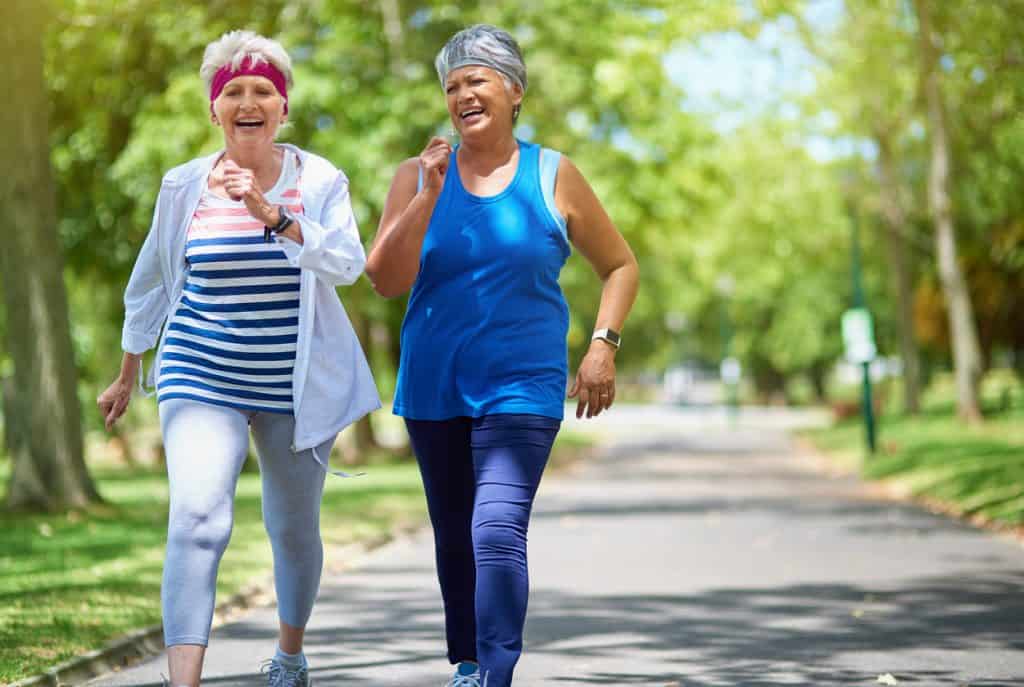
As women, our bodies don’t really give us an easy run through life. In our formative teenage years we have to start dealing with dramatic changes in body shape and monthly visits from ‘Aunty Flow’. She brings with her mood swings, cramps and cravings (and that’s the best-case scenario!).
Then, many women go through pregnancy and child birth, which often have unexpected effects on their bodies. Nausea, stretch marks, emotional turmoil, more cravings and the unbelievable challenge of giving birth, just to name a few! Don’t get me wrong, it’s all part of the truly amazing process of new life. But when you’re living it, I imagine it wouldn’t always be pleasant.
After all that we, have menopause to look forward to. Hot flushes and sweats, fatigue and more body shape changes! It doesn’t seem very fair, does it?
Is weight gain during menopause inevitable?
Oestrogen is a complex hormone which affects a huge variety of processes in the body, particularly around metabolism. There is a considerable amount of research to suggest that as we go through menopause and our oestrogen drops off, weight increases and we get more body fat, particularly around our abdomen.
There are 2 main reasons why there is an increase in body fat during menopause:
-
Slower metabolic rate
As we get older, and particularly as oestrogen levels reduce after menopause, our body starts to conserve energy. We don’t build and repair our tissues as rapidly and we start to break down the things we don’t need as much, like muscle. All of these changes mean that our metabolic rate gets much slower. But, if we keep eating the same amount of energy when our body doesn’t need it, our body stores that excess energy away as fat.
-
Less fat breakdown
Oestrogen plays a key role in determining how our body breaks down and distributes fat throughout our body. There is research to suggest that as our oestrogen decreases in menopause, our body reduces fat oxidation (breakdown). So, we are less likely to utilise our stored energy post-menopause.
These metabolic changes mean that if we keep food intake and exercise the same as we go through menopause, theoretically, yes we will gain weight.
That sounds bleak, but it doesn’t have to be!
So, what can I do about it ?
Get an accurate measure of your energy needs
If we know that our metabolic rate is bound to change when we go through menopause, then there is no point using the same strategies to lose weight as we did in our 20s or 30s. Rather than labouring endlessly under a diet that prescribes ‘X’ calories, it is most worth your while to get a body composition analysis. This scan gives us an estimate of your resting metabolic rate based on your body’s needs, not a rough estimate based on weight alone. From there your practitioner can account for your activity levels and establish the right energy deficit to assist with weight loss.
Maximise metabolic rate
There are several things we can do to get our body using as much energy as possible. Move!
If we are trying to burn more energy the obvious answer is exercise! This holds true after menopause. Any type of movement will do. It could mean starting a new hobby or trying out a new activity. For instance, I have just discovered adult beginner ballet and there are women and men there of all ages and abilities. Or it could be finding ways to increase the amount of steps you take. All movement counts!
Build more muscle
Because muscle is metabolically active, the more we have, the more energy we burn day-to-day. Building muscle is an essential part of maintaining weight after menopause. The key factors to achieve this are resistance exercise and adequate protein intake. This could mean regularly including some body weight exercise that help strengthen the muscles in your arms, legs and torso.
You could try:
- Lunges
- Push ups (starting on your knees)
- Tricep dips
- Crunches
- Squats
- Step ups
To ensure you are getting enough protein and build and repair the muscles that you are working, make sure you have a serve of protein with each meal. Check our recipes to find breakfasts, lunches and dinners with great portions of protein, carbohydrates, healthy fats and more.
Load up on vegetables
Our body has to use some energy to break our food down and absorb it. This is called the thermic effect of food. Non-starchy vegetables are low in calories and loaded full of fibre, which we cannot digest. So the fibre moves through our system without being absorbed. This means that for many non-starchy vegetables, our body uses more calories to process them, than it gets from the food. Cool, aye?
So filling your plate up with non-starchy vegetables can help to optimise your metabolism while controlling your energy intake.
Stay hydrated
In the same way that vegetables don’t contribute much to calories but fill us up, water is important for remaining satiated and it contains no calories at all! Being well hydrated can help to manage food cravings, improve concentration and help everything move through our system easily. Getting 1.8 – 2.5 litres per day is often a nice, simple thing to track and focus on.
Minimise the things that can disrupt weight loss
While we can get those aspects rolling to boost your metabolism, there are other things that can disrupt our body and our perspective when it comes to achieving long term weight loss:
Manage stress
There is a lot of research to suggest that ongoing stress can hamper our ability to lose weight. Stressful situations raise our adrenalin and cortisol. Ongoing stress, and elevated cortisol can affect the storage and distribution of body fat.
Not only does stress effect our metabolism, raised stress levels can often lead us to make poor food choices. As our dietitian, Rebecca Mete, outlined in her article on ‘Stress and Food’, when we are stressed and anxious we usually reach for energy dense foods and alcohol for comfort. These things can make it difficult to manage our energy budget and lose weight, particularly after menopause. Identifying non-food ways to manage stress is an essential element of weight loss for post-menopausal women.
Get enough rest
As Kate Freeman discussed in her article “Inadequate Sleep Can Stall Weight Loss Efforts”, not getting enough rest can impact our body’s ability to regular blood sugar levels, hunger and satiety.
Keep it simple
Losing weight can be a daunting task, even at the best of times. It’s easy to feel like the goal is too big or too intangible and we will never get there. We can over think our food choices and get really down on ourselves and our bodies.
But how do you eat an elephant? One bite at a time. Take it one step at a time and focus on making progress with the small, day-to-day habits. The team at The Healthy Eating Clinic can help you break it into these achievable chunks and support you along the way.
The bottom line
The menopausal changes to our body can make it easier to gain weight (particularly around our middle) and harder to lose weight, but it’s not impossible. The key is to understand these changes and adapt our weight loss strategies to suit. What worked in our 20s and 30s won’t work in our 50s and 60s. If you are keen to get an accurate picture of your metabolic rate, come in for a body scan and get some practical strategies to manage your weight from one of The Healthy Eating Clinic practitioners.
If you’d like further help with your nutrition please click below:



